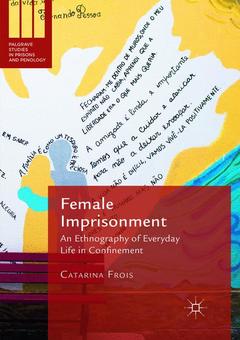Female Imprisonment, Softcover reprint of the original 1st ed. 2017 An Ethnography of Everyday Life in Confinement Palgrave Studies in Prisons and Penology Series
Langue : Anglais
Auteur : Frois Catarina

This book is a reflection on the nature of confinement, experienced by prison inmates as everyday life. It explores the meanings, purposes, and consequences involved with spending every day inside prison. Female Imprisonment results from an ethnographic study carried out in a small prison facility located in the south of Portugal, and Frois uses the data to analyze how incarcerated women talk about their lives, crimes, and expectations. Crucially, this work examines how these women consider prison: rather than primarily being a place of confinement designed to inflict punishment, it can equally be a place of transformation that enables them to regain a sense of selfhood.
From in-depth ethnographic research involving close interaction with the prison population, in which inmates present their life histories marked by poverty, violence, and abuse (whether as victims, as agents, or both), Frois observes that the traditional idea of ?doing time?, in the sense of a strenuous, repressive, or restrictive experience, is paradoxically transformed into ?having time? ? an experience of expanded self-awareness, identity reconstruction, or even of deliverance. Ultimately, this engaging and compassionate study questions and defies customary accounts of the impact of prisons on those subjected to incarceration, and as such it will be of great interest for scholars and students of penology and the criminal justice system.
Chapter 1.Introduction. A “Doll’s House”.- Chapter 2. Portugal, a “Mild-Mannered” Country. Penal and Penitentiary Overview.- Chapter 3. Entering Odemira Prison Facility.- Chapter 4. ‘Will You Be Back Again Tomorrow?’.- Chapter 5. The Effects of Imprisonment.- Chapter 6. Tension, Authority, Rights.- Chapter 7. The Rule, the Letter, the Spirit of the Law.- Chapter 8. Institutionalizing Exclusion.- Chapter 9. “Getting in is Fast, Getting out is Harder!”Chapter 10.Conclusion
Catarina Frois is Senior Researcher at the Center for Research in Anthropology and Invited Assistant Professor in the Department of Anthropology, ISCTE - Instituto Universitário de Lisboa, Portugal.
Provides a criminological and anthropological analysis of a "safe haven" prison setting Offers a detailed exploration of women's lives in a facility in South Portugal, exploring inmates' detailed narratives, a focus on female confinement, and the importance of family and relationships before and after imprisonment Speaks to academics and professionals in Criminology, Sociology, Anthropology, Human Rights and Psychology
Date de parution : 06-2019
Ouvrage de 231 p.
14.8x21 cm
Date de parution : 01-2018
Ouvrage de 231 p.
14.8x21 cm
Thèmes de Female Imprisonment :
© 2024 LAVOISIER S.A.S.
